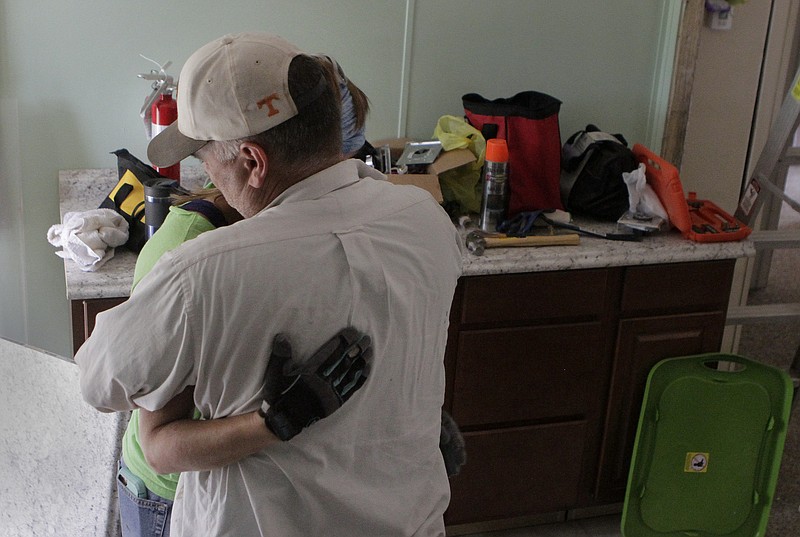For more information about Blazing Hope Ranch
Contact David and Jo Haggard at 423-667-3820Email: blazinghopetn@gmail.com
Jo Haggard shares few details about the sexual violence she suffered during her childhood. She says only that the circumstances were so painful that she self-injured through cutting and contemplated suicide daily.
Her faith in God and heartfelt talks with horses helped her survive and compels her to help others so much that she started a camp and a ministry on a 120-acre ranch in Rhea County, Tenn., dedicated to restoring sex trafficking survivors and eliminating the $32 billion industry.
"It could have screwed me up, and it did for a few years, but here I stand," she says.
More than 200,000 children a year are sexually exploited in the United States, according to the Polaris Project, an organization that works to eradicate modern slavery.
Haggard seeks to rescue survivors and weaken the industry.
This week, the 36-year-old wife and mother is hosting Camp Run Free at the Rhea County Fairgrounds for about 30 youth ages 8-13. Haggard distributed applications for the camp to officials at the Department of Human Services, United Way and at the annual Strawberry Festival in Dayton. She selected from among the first applications returned until she reached capacity.
The camp uses the Born To Fly International curriculum to teach self-worth, the main defense against trafficking, says Haggard.
Fewer than 1 percent of youth are kidnapped in stranger abductions, according to a National Child Kidnapping Facts report from the Polly Klaas Foundation, named for a 12-year-old girl who was kidnapped at knife point and strangled to death in 1993.
Many youth get lured into sex trafficking because they're looking for love and acceptance. Predators see that and appeal to their desire for attention and approval, says Haggard.
The goal at camp is to make youth so aware of their value that they are not deceived by adults (men and women) offering gifts as they attempt to groom them for the sex trade. The average age of a trafficked victim in the U.S. is 14, she says.
A third of teens on the street will be lured toward prostitution within 48 hours of leaving home, according to the U.S. Department of Justice's National Center for Missing and Exploited Children.
Hamilton County reported 26 to 50 cases of sex trafficking from 2009-10, the latest statistics available, according to Second Life Chattanooga's website, secondlifechattanooga.org.
Haggard always wanted to help troubled youth. She expanded her vision to women after working as a counselor in an Oregon hospital, where a teenage girl was treated after being sold and chained against her will for years.
"I believe in a God who redeems," says Haggard, a child and family therapist.
Blazing Hope Ranch is a place where women who've suffered dehumanizing circumstances, including slavery, repeated rapes, drug abuse, beatings and brokenness, move toward healing and learning their value.
Haggard has two homes on the ranch that can house six women at no charge for 18 to 24 months.
She's still renovating the homes but hopes to have them ready for occupancy before the end of summer. She networks with Chattanooga Coalition Against Human Trafficking, founded by Second Life of Chattanooga and the Partnership for Families Children & Adults, for clients. She's also prepared to take clients referred by other survivors or who seek out the site online.
She has one Chattanooga client already waiting to live there and participate in the program.
The women will learn life skills such as home management and applying for and maintaining a job. She anticipates the four horses on the ranch will be therapeutic as they go through the process.
She remembers many days during her youth in a Delaware suburb going into a stall to cry with a horse named Sugarfoot and the horse sensing exactly how to interact with her.
"They're very aware of their surroundings," she says. "Because of that, any emotion or fear that you come in with, they sense it and react accordingly."
Call
The National Human Trafficking Hotline: 888-373-7888
The only compensation for most people working on the ranch is knowing they're impacting the lives of people.
All but two people at Blazing Hope Ranch volunteer their service, but Haggard still spends about $13,000 a month to operate the ranch, including care for the horses, utilities and insurances. Only the live-in program manager and assistant program manger get paid. Haggard and her husband work for free.
Haggard's husband, David, 39, is director of financial aid at Bryan College. John Tomaro works part time at Lowe's in Dayton and is the ranch's volunteer maintenance and repairman.
Haggard and most ranch volunteers hold back tears when discussing the ministry.
On a recent work day at the ranch, board member Connie Arnold stops hammering nails to grab her husband's hand as he talks about their focus on helping sex trafficking survivors.
"There's a lot of talk about ending human trafficking, but those are laws and initiatives," says Michael Arnold, his voice cracking.
"We can put the bad guys in jail, but no one thinks about (helping the survivor return to normal life.)"
That's why he felt moved to help when Haggard opened Blazing Hope Ranch.
"There is a movement to end sex trafficking, but these ladies need help now," he says. "I want to see this be a place where they can be reacclimated to what real life is."
Contact Yolanda Putman at yputman@timesfreepress.com or 423-757-6431.

